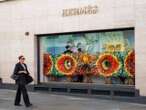If you’ve felt like you were being fleeced at the pump in recent years, your instincts might be more on the money than you realize.
According to Visa’s State of Scams: Fall 2024 Biannual Threats Report, released on Wednesday, fraudsters have been increasingly targeting customers at gas stations in the U.S. and worldwide. While in-person transactions, including those at gas pumps, tend to be among the most secure, scammers have found a way to capitalize on vulnerabilities within the transaction protocol.
“When you make a purchase, what happens is that the gas station sends a check to your bank to see if your card is valid and has at least a $1 balance,” says Michael Jabbara, senior vice president, Global Head of Fraud Services at Visa. “If it clears, you start pumping, and the final amount is charged to your card—but not all banks have it configured correctly, so fraudsters get their hands on cards with a $1 balance, the bank authorizes it, and they pump $100, $200 worth of gas,” he says.
And they’re not merely filling the tanks of Honda Civics. These fraudsters are becoming increasingly corporatized and organized, Jabbara says—they’ll fill tanker trunks and feed the pilfered fuel into a black market for gasoline. It was something originally seen in Latin America but has since spread to the States, as well as most other parts of the world. While this can have a noticeable impact on gas stations, it can affect consumers, too, who may have had their identities stolen to open lines of credit or bank accounts, or have their physical cards stolen, too.
Additionally, some of the other key findings from the report include the fact that plain old vanilla physical theft has been on the rise over the past six months, as have government impersonation scams (often involving agencies like the FBI, IRS, and even the U.S. Postal Service). Scammers are even using generative AI to level up phishing attempts.
“Fraudsters are far more organized and technically savvy than the average consumer expects them to be. We all think of someone dressed in a hoodie in a basement; they’re well-funded and organized. They’re highly motivated to run their business in a profitable way,” says Jabbara. And he adds that they “100%” think of their activities as a “business,” too.
In all, the underbelly of fraudsters and scammers is evolving and becoming more sophisticated. Jabbara says that Visa has invested billions to keep up with them in recent years, but consumers are still taking precautions, which is still the best bet to keep themselves safe. He recommends using common sense and not falling for “too good to be true” types of deals or offers, safeguarding your data when shopping online, and using tools such as transaction alerts to monitor your accounts. Those are relatively simple steps, but they can make a big difference.
“It’s a big, scary world out there” for consumers, he says. Adding that, unfortunately, “it’s never been a better time to be a fraudster.”







No comments